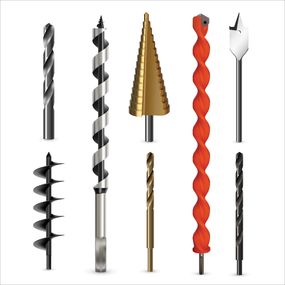To drill into concrete, you need the right drill bit. Using the wrong one can damage your tools or the material.
So, how do you know which drill bit to use for concrete? Concrete is tough and requires special drill bits. Regular bits won’t work well and might break. Masonry bits are designed for this task. They have a carbide tip that can cut through concrete.
You must also consider the size and type of your drill. Hammer drills work best with concrete. They provide the power needed to break through tough surfaces. Knowing these details helps you choose the right bit. This guide will help you find the perfect drill bit for your concrete project.

Credit: www.home-dzine.co.za
Article Summary
Choosing The Right Drill Bit
Drilling into concrete is tough. It requires the right tools. Choosing the right drill bit is crucial. The correct bit makes the job easier and quicker. It prevents damage to your tools and materials. Let’s explore how to choose the right drill bit for concrete.
Importance Of Selection
Selecting the right drill bit is essential. Concrete is a hard material. Not all drill bits can handle it. Using the wrong bit can cause breakage. It can also lead to inefficient drilling. The correct bit ensures smooth drilling. It also prolongs the life of your drill.
Impact On Performance
The right drill bit impacts performance. It affects the speed and efficiency of your work. A suitable bit reduces the effort needed. It ensures clean and precise holes. This is important for structural integrity. It also minimizes wear and tear on your drill. Using the right bit means fewer mistakes and better results.

Credit: home.howstuffworks.com
Types Of Drill Bits For Concrete
Choosing the right drill bit for concrete is crucial for efficient and safe drilling. Different types of drill bits are designed for specific tasks, and using the correct one can make a significant difference. Understanding the various options available will help you pick the best drill bit for your project.
Masonry Bits
Masonry bits are the most common type used for drilling into concrete. They are designed with a tungsten carbide tip that can withstand the hardness of concrete. These bits are available in different sizes and can be used with standard electric drills. Masonry bits are perfect for small to medium-sized holes.
Hammer Drill Bits
Hammer drill bits are specifically designed for use with hammer drills. They have a special flute design that helps remove dust and debris as you drill. These bits are ideal for tougher concrete surfaces where more power is needed. The hammer action of the drill combined with these bits makes drilling faster and more efficient.
Diamond Drill Bits
Diamond drill bits are the premium choice for drilling into concrete. They are embedded with tiny diamond particles, making them extremely durable and effective. These bits are perfect for precision drilling and can handle the hardest concrete surfaces. While they are more expensive, their longevity and performance make them worth the investment for heavy-duty projects.
Materials And Coatings
Choosing the right drill bit for concrete is crucial for successful projects. Different materials and coatings on drill bits affect their performance. Understanding these can help you make an informed decision.
Carbide-tipped
Carbide-tipped drill bits are popular for concrete drilling. They offer durability and precision. The carbide tip helps in cutting through hard materials like concrete. It stays sharp longer than other materials. This means fewer replacements and efficient drilling.
Diamond-coated
Diamond-coated drill bits are another excellent choice. They are ideal for heavy-duty concrete drilling. The diamond coating provides superior cutting power. It makes the bit more wear-resistant. These bits handle tougher jobs with ease and last longer.

Credit: www.reddit.com
Drill Bit Sizes
Choosing the right drill bit size for concrete is crucial. It ensures precision and efficiency in your project. With the right size, drilling becomes easier and safer. Here, we will explore the standard and specialty sizes for concrete drill bits.
Standard Sizes
Standard drill bits for concrete usually range from 3/16 inch to 1/2 inch. These sizes cover most general applications. For basic household projects, these sizes are perfect.
| Size (inches) | Common Uses |
|---|---|
| 3/16 | Light-duty tasks, small anchor bolts |
| 1/4 | Medium-duty tasks, wall plugs |
| 3/8 | Heavy-duty tasks, larger wall plugs |
| 1/2 | Very heavy-duty tasks, large bolts |
Specialty Sizes
For more specific tasks, specialty drill bit sizes come into play. These sizes are less common but very useful for particular needs.
- 5/8 inch: Ideal for thick concrete slabs.
- 3/4 inch: Useful for installing large anchors.
- 1 inch: Needed for very large holes and industrial tasks.
Specialty sizes offer better performance for specialized tasks. They provide the right fit for demanding projects.
Drill Bit Compatibility
Choosing the right drill bit for concrete can be confusing. You need to ensure the drill bit is compatible with your drill. This ensures efficiency and prevents damage. Let’s dive into the details of drill bit compatibility.
Matching Drill And Bit
First, check the power of your drill. High-powered drills work best with tougher drill bits. Standard drills may not handle concrete well. Hammer drills are great for concrete. They use a pounding motion. This breaks up the concrete as it drills.
Next, ensure the bit fits your drill. Look at the size of the chuck. The chuck is the part that holds the drill bit. Most drills have adjustable chucks. This means you can use different-sized bits. Make sure the bit is secure in the chuck. A loose bit can cause problems.
Checking Shank Types
The shank is the end of the drill bit that goes into the drill. There are different shank types. The most common is the straight shank. This works with most drills. Some bits have a hex shank. These are less likely to slip in the chuck.
SDS shanks are another type. These are used in hammer drills. They provide more grip and reduce slippage. Check your drill’s manual. It will tell you which shank type to use.
Choosing the right shank ensures the bit stays in place. It also helps with the drill’s performance. Always match the shank to your drill.
Drilling Techniques
Drilling into concrete requires specific techniques to ensure clean and efficient results. Understanding the right drilling techniques can save time and prevent damage to your tools and materials. Let’s explore the key elements of proper drilling techniques for concrete.
Proper Speed And Pressure
Maintaining the right speed and pressure is crucial when drilling into concrete. High speeds can cause overheating and damage the bit. Slow speeds, on the other hand, might not penetrate the concrete effectively.
- Speed: Use a slow to medium speed setting on your drill. This helps prevent bit wear and overheating.
- Pressure: Apply consistent, moderate pressure. Too much force can break the bit; too little can slow progress.
It’s essential to let the drill bit do the work. Avoid pushing too hard; this could lead to cracks in the concrete.
Cooling The Bit
Cooling the drill bit helps maintain its effectiveness and longevity. Concrete drilling generates a lot of heat, which can quickly wear out the bit.
- Water: Use a spray bottle to apply water to the bit. This cools it down and reduces dust.
- Pauses: Take breaks to allow the bit to cool. This prevents overheating and prolongs its life.
Keeping the bit cool also helps maintain drilling efficiency and prevents damage to the concrete surface.
By following these drilling techniques, you can ensure clean, precise holes in concrete. This will make your projects more successful and extend the life of your tools.
Safety Measures
Ensuring safety while drilling into concrete is crucial. Concrete drilling can be hazardous, and without proper precautions, it may lead to injuries. Follow these safety measures to protect yourself and achieve a successful drilling experience.
Protective Gear
Wearing the right protective gear is essential. Here is what you need:
- Safety Glasses: Protect your eyes from flying debris.
- Ear Protection: Drilling can be noisy. Use earplugs or earmuffs.
- Gloves: Guard your hands against cuts and abrasions.
- Dust Mask: Prevent inhaling concrete dust.
- Sturdy Footwear: Ensure your feet are safe from falling objects.
Handling Dust
Concrete drilling creates a lot of dust. Managing this dust is crucial for safety and visibility. Here are some tips:
- Wet Drilling: Use water to minimize dust. Wet the surface before drilling.
- Vacuum Attachment: Attach a vacuum to your drill. This helps collect dust as you work.
- Clean Workspace: Regularly clean the drilling area. Remove accumulated dust to keep the site clear.
Taking these safety measures ensures a safer and more efficient drilling process. Always prioritize your health and safety.
Maintenance And Care
Maintaining and caring for your drill bits ensures they last longer and work efficiently. Proper maintenance can prevent damage and ensure better performance, especially when drilling into tough materials like concrete.
Cleaning The Bit
After each use, clean your drill bit thoroughly. Concrete dust and debris can build up, affecting its performance. Use a stiff brush to remove any particles. For stubborn debris, a wire brush might be necessary. Wipe the bit with a clean cloth to remove any remaining dust.
Regular cleaning prevents the bit from wearing out quickly. It also ensures accurate and efficient drilling. A clean bit cuts more smoothly and reduces strain on your drill.
Storing Properly
Proper storage is crucial to maintain the quality of your drill bits. Store them in a dry place to prevent rust and corrosion. Use a dedicated drill bit case to keep them organized and protected. Storing bits loosely can cause damage or dullness.
Keep your bits separated by size and type. This helps in quickly finding the right bit for your next project. Avoid exposing them to extreme temperatures, which can affect their durability.
Following these maintenance tips will ensure your drill bits remain in top condition. This way, they will be ready for your next concrete drilling task.
Frequently Asked Questions
What Drill Bit Is Best For Concrete?
For concrete, use a masonry drill bit. These bits are designed to handle hard surfaces and provide better results.
Can I Use A Regular Drill For Concrete?
A regular drill can be used if it has a hammer function. Otherwise, it may struggle with concrete.
How Do I Identify A Masonry Drill Bit?
Masonry drill bits have a carbide tip and a thicker shank. They are often labeled for masonry or concrete use.
Why Do Masonry Bits Have Carbide Tips?
Carbide tips provide extra durability and strength. They are essential for drilling through tough materials like concrete.
Conclusion
Choosing the right drill bit for concrete is crucial. It ensures efficiency. Remember, masonry bits are your go-to choice. They work best on hard surfaces. Pay attention to the bit’s quality. High-quality bits last longer and perform better. Always start with a pilot hole.
It helps guide the bit. Use proper drilling techniques. This prevents bit damage and improves results. With these tips, you can confidently drill into concrete. Your projects will be smoother and more successful.